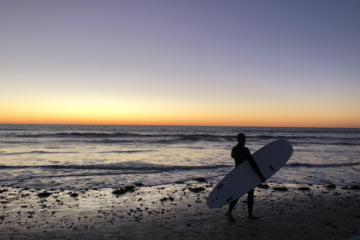Is There a Way to Surf and Stay in School?
Between 6:30 a.m. surf practice, school, Jiu-Jitsu and homework, free time is essentially non-existent for Sophia Arky.
That’s because Arky is a rare breed in the world of aspiring professional surfers. She isn’t home-schooled.
Unlike friends her age, this 14-year-old aspiring surfer has not taken the plunge and dropped out of high school in order to solely focus on her surfing career.
“My parents think that education is more important than sports,” she says.
Surfing and school…these two words very rarely find themselves being paired together. Why is that? Some argue it is simply not possible to do both.
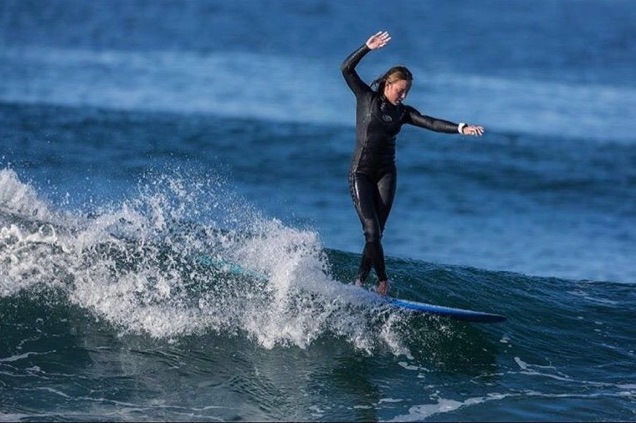
Sophia Arky
The sheer time commitment required to excel in either world makes it seem dauntingly impossible to combine them into one.
An aspiring professional surfer must spend hours traveling to follow the swell, competing in contests, networking to get sponsors and going on photo trips. This is all in addition to the time he or she spends in the water actually surfing. This lifestyle requires a flexible schedule that most schools (high school and college) can’t accommodate.
Students are left with two major decisions. Early on, do they go to high school or become home-schooled? Later, do they pursue a college degree or focus solely on a professional surfing career?
Arky’s parents already made the first choice for her: She’s staying in high school. She surfs as much as she can and also keeps up with her studies in order to continue along her path to becoming a professional surfer and surgeon. She is realistic though.
“I hope I can do both,” she says. “I really don’t want to have to choose, but most likely I will have to choose because when you’re a surfer you have to put 110% into it.”
She may be right, but in the meantime Arky is going to put the decision off as long as she can in order to try to excel academically and athletically.
But it’s no easy task.
“I feel like in the mornings, sometimes I get pretty tired because I wake up so early and go to sleep so late,” she says.
The traveling aspect of competitions also causes her to miss class sometimes, which can really get her in trouble.
“I have an AP test coming up and I missed so many classes from surf competitions that I’m a little behind,” Arky says.
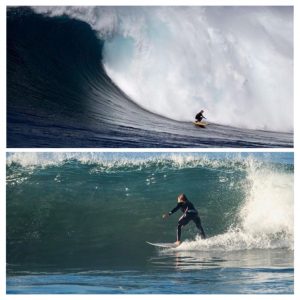
Sage Burke and Sophia Arky
Someone who doesn’t have to deal with striking this delicate balance between school and surf is 15-year-old aspiring big wave surfer Sage Burke.
Burke’s father, electrical engineering professor Douglas Burke, made the decision to home-school him since the beginning of fifth grade.
“It wasn’t a hard decision because he’s that kind of a kid where I think it’s important for him to do physical stuff,” says professor Burke.
This father and son duo could not credit surfing enough for how it’s shaped them to be fearless, respectful and optimistic.
“Surfing is a great physical and mental activity and it’s going to make you a better person and a more effective person in anything that you do,” says professor Burke. “So, if he doesn’t become Kelly Slater, every moment surfing was still a payoff to him.”
Sage feels like the flexible schedule of home-schooling has afforded him so much more leeway, allowing him to follow the unpredictable swells.
“I feel like if anybody wants to become a professional athlete, home-school gives you so much more time to practice because you can just go all day and then stay up late doing the homework that you have,” says Sage.
One of the biggest criticisms of home-schooling is the lack of social interaction. However, Sage has had no trouble in that realm. He is still best buddies with the same friends he had in fifth grade.
Just because Sage has taken the home-schooling route doesn’t mean he plans on skipping out on a college degree though. “You definitely want to have something to fall back on for sure,” he says. “If you’re going to lack in education you should definitely make sure you’re going to make it.”
Sage is certainly determined to make it.
“I want to become a World Tour surfer, whether it’s on the Big Wave Tour or the normal one,” he says. “But I feel like they are both manageable goals if you work hard and you do all the right steps along the way. You can easily do it with hard work.”
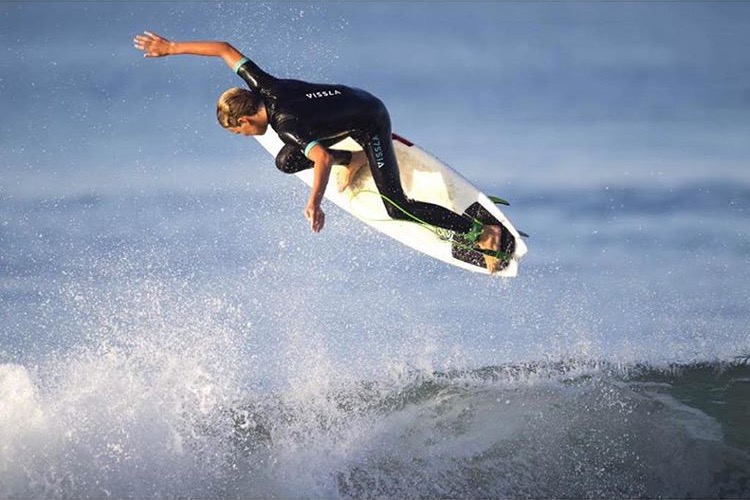
Sage Burke
A surfer with a similar drive and desire knew he wanted to be a professional surfer since his earliest days. Professional surfer and now business owner Chase Wilson remembers a time in the first grade when his teacher had the class write down on a little notecard what they wanted to be when they grew up.
You can guess what he wrote…
However, Wilson did not go the typical home-schooling route in high school to pursue this goal. At the time, he may have hated going to class, but looking back it was so much fun and he doesn’t regret it one bit.
“I don’t think home-schooling would have bettered my surfing at all because I was still out there twice a day, in the mornings with surf team and then in the afternoons if the waves were good,” he says.
Although he could find a balance between school and surfing in high school, he wasn’t able to continue this in college. He ended up dropping out of the University of California Santa Barbara after his first quarter to pursue his professional surfing career full force.
“I was missing midterms and finals to travel,” he says. “So, I kind of had to make that decision whether I wanted to give [surfing] my all or focus on school and kind of dabble in both.” He ultimately decided to go with surfing.
Despite ending his formal education, he actually gained a tremendous amount of firsthand learning that couldn’t really be taught in a classroom setting. Much of his growth came from launching his own hair product company, Byrd, inspired by his professional surfing lifestyle.
“I’ve learned so much along the way since starting Byrd from sales, to running a business, to financing,” he says. “I think business firsthand is a classroom and maybe even a college degree in itself.”
Although Wilson couldn’t do both, World Qualifying Series surfer and UCLA graduate Tad McCardell found a way to make it work. But it wasn’t without struggles.
“Surfing-wise it’s really difficult to try and be in the scene, travel, do photo trips and all that stuff because you just can’t leave school if you’re trying to actually get good grades,” says McCardell.
However, he definitely does not regret his decision to get his degree.
“I would recommend doing school while also putting a lot of effort into surfing and seeing how far that can push you,” he says. “I don’t think that you should skip out on academics because it’s such a good part of your life.”
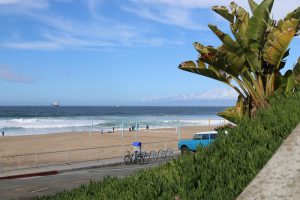
El Porto
Because of the nature of the sport, there are very few who ever earn a spot in the coveted World Tour. Thus, a degree serves as a solid back-up plan.
Arky and McCardell are showing it is possible to pursue a professional surfing career while also earning a degree. However, Burke and Wilson also highlight the abundance of learning opportunities in the world of surfing itself.
Regardless of the ways they’ve each gone about their professional surfing pursuits, all four student athletes have one thing in common: Their undeniable passion for surfing.
Each demonstrates in their own way how hard work and determination can lead to success in the seemingly incompatible worlds of surfing and education. McCardell works four jobs in order to afford his contest travels since graduating from college. Likewise, Burke trains rigorously in and out of the water on top of surfing in all kinds of locations from El Porto to Pipeline.
There’s no doubt that this complicated balance between surfing and education is a “true juggling act,” says Wilson, but “you always figure out a way if you want something bad enough.”


